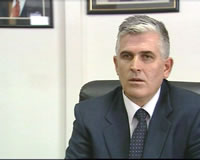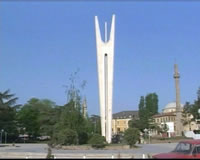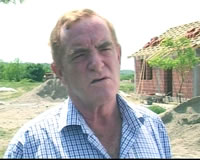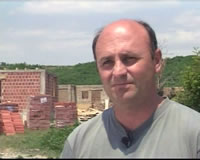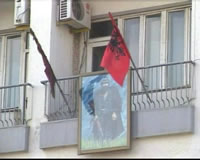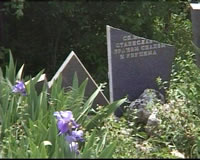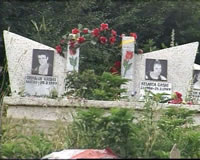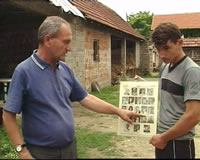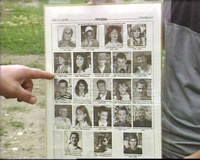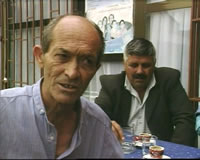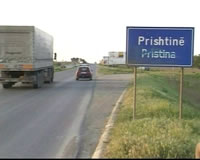00:01:04
On the Belgrade- Prishtina dialogue
We would like very much that this dialogue could have started during the month of July. Now, we are at the very end of the month, we are almost at the end and we have not been able for I think one major reason: the Special Representative of the Secretary General has not been nominated, therefore, starting dialogue without this personality was considered to be not the most appropriate path to take. Since we have the understanding that this person is going to be nominated very soon, we decided to wait a little bit more. Because the two sides, the Kosovars and Serbs, Belgrade and Prishtina have again reiterated the commitment to the dialogue and it is very important to maintain this momentum and to use this momentum and therefore we have the clear commitment of the two sides,that the dialogue,as soon as it is ready in terms of the international personality that we are waiting , that it is going to be launched. And yes, we have a clear strategy: we are convinced that the dialogue has to start about very specific issues and progressively move into areas of mutual interest of political dimension and by having this dialogue, by taking specific decisions, the two sides will create an atmosphere of trust, an atmosphere of working relationship which will allow, at one point, hopefully sooner than later to be able to discuss very difficult issues. Therefore, the time length of this dialogue will be very much dependent on the willingness, the readiness of reaching consensus of the two sides. And we want to encourage the two sides to come to this dialogue with a very open mind and we think that through the bilateral context we have had with the two sides there is a willingness to start this dialogue within this month. It was very clear the message we got from Thaci that the discussions on the final status have to be left for later on. The dialogue is now, as I was saying before, for steps that have to lead to create confidence, to create tasks and have to be on the basis of an agenda that is mutually agreed of issues that both sides are ready to discuss and the constructiveness of Mr. Thaci was very much appreciated by the European Union and we hope very much that this sense of constructiveness will be reflected in the politics of the daily life in Kosovo. 00:03:57
On the internal political disputes in Serbia We do not think that forces which share democratic values, which share willingness to progress in terms of getting closer to the European Union, reforming the economy, reforming the state structures should be fighting each other. We think that this is not the best thing to do. At the same time, we understand because they are democratic forces. Therefore, we should not dramatize this, but we should be mild in tone, constructive in form, but very clear in the substance that we want these in-fighting to have not at all a negative impact. There should be political dialogue, there should be political discussions but at the very same time,they should bear the responsibility of being the political forces that have to be moving forward Serbia and Montenegro. Therefore, with a degree of worringness, not dramatic but the message is clear that this in-fighting has to stop. 00:05:00
On the visit to Brussels of Ali Ahmeti, leader of the Albanian coalition party partner in the Macedonian Government and the implementation of the Ohrid Agreement in Macedonia The message that Mr. Ahmeti got from the European Union, from Javier Solana was of appreciation for the role he has played in particularly since his party is of the coalition, the government of coalition in Skopje for the very pragmatic approach, an approach which has led to results, an approach which has lead to a good relationship of the society overall in Macedonia. The process in Ohrid opened a new page in the history of Macedonia, now we are in this very new phase. It's going well, it is probably insufficient but it will not reach the type of moment of final, total solution of the problems until more efforts are being done and therefore his attitude should continue and we praise both very much the government and the leader of the DUIE because it has been constructive and it has been very positive. It is clear that calls that Albanian parties might have in the line of further separation and not integration is not the line the European Union supports and Ahmeti, Mr. Ahmeti said it very clear to Solana, to Mr. Javier Solana that he did not share disintegration. He shares and he will fight for more integration.
00:06:32
On the Concordia follow- up police mission in Macedonia
We don't think that this police force should be a police force that should be doing daily duties of normal police. On the contrary, it should be a police force, not armed, which should be monitoring and mentoring the local police, should be helping supervise practices, change some of the practices if they are not in total accordance with European Union standards and we hope very, very much that a very clear design of the new police force will be ready soon and can be shared and discussed with the Macedonian authorities so that the decision could be adopted by the moment when Concordia finalizes its presence without having this structure which, in any case,will not be in a structure of a
regular police patrolling the streets, detaining, implementing the law and order regulations but helping the local police do their job in a manner which is more according the EU standards. |
 Facebook
Facebook Twitter
Twitter

